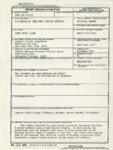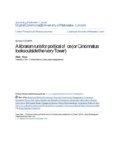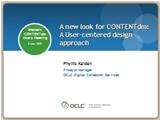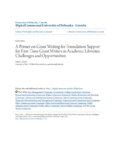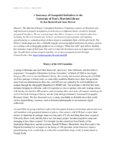8
Cowan, Derek; DuVall, Scott L. Academic podcasting:quality content delivery 2009-09-23 Our weekly department seminar has been available as streaming video for several years. Streaming video depends on a reliable, broadband connection for the entire duration of viewing for consistent video quality. Even users with faster internet connections have reported poor video quality at times. A new system for distributing the seminar was developed that takes advantage of content syndication technology. Podcasting is a form of web syndication whereby multimedia content is made available for use by other applications. By making the seminar available as a podcast, some of the problems related to streaming video broadcasts are resolved. text; image Academic Podcasting: Quality Content Delivery Jacob S Tripp BS1, Scott L DuVall BS1, Derek L Cowan2, Aaron W C Kamauu MD, MPH, MS1 1Department of Biomedical Informatics, University of Utah, Salt Lake City, Utah 2Spencer S Eccles Health Sciences Library, University of Utah, Salt Lake City, Utah Feed Reader Checks for and Downloads Attend any New Files Seminar Watch Live Broadcast Watch Streaming Video Create Downloadable Video Create Streaming Video Retrieve Downloadable Video Browse to Live Internet Streaming Video Broadcast Watch Downloaded Video Transfer to Portable Device Watch on Portable Device Record Update RSS Feed Introduction Our weekly department seminar has been available as streaming video for several years. Streaming video depends on a reliable, broadband connection for the entire duration of viewing for consistent video quality. Even users with faster internet connections have reported poor video quality at times. A new system for distributing the seminar was developed that takes advan-tage of content syndication technology. Podcasting is a form of web syndi-cation whereby multimedia content is made available for use by other appli-cations. By making the seminar available as a podcast, some of the problems related to streaming video broadcasts are resolved. In addition to be available as a live webcast, department seminars are recorded in AVI format, converted to Real Media streams, MP4 video and MP3 audio formats, and stored on the Eccles Health Science Library multimedia server. We developed a database-driven web application to input and store seminar metadata and automatically generate files that conform to Really Simple Syndication (RSS) 2.0 (http://blogs.law.harvard.edu/tech/rss), an XML schema that defines machine-readable descriptions and links to media in a web feed. These RSS files also contain specific tags that allow the feeds to be published in the iTunes Music Store Podcast Directory. End users can subscribe to video and audio feeds through web-based podcast listeners or desktop-based feed aggregators that support file enclosures. The podcast is indexed in several podcast directories including Apple Computer's (Cupertino, CA) iTunes Music Store Podcast Directory. iTunes is unique in that it combines a web-based podcast directory with the desktop-based feed reader. Discussion Podcasting is quickly gaining popularity. Podcasts can be transferred to por-table media devices allowing for viewing away from the computer. By making the seminar available in this format, viewers experience an improved viewing experience at a convenient time and place. Only a small fraction of existing podcast would be considered academic. The University of Utah Bio-medical Informatics Seminar is one of only two podcasts listed in the iTunes index on the topic of Medical or Biomedical Informatics. This seminar is an approved source of CME for live viewing, either in person or remotely. This presents the possibility of the podcast also becoming an online source for CME credit. Acknowledgements This research was supported by National Library of Medicine Training Grant T15 LM007124. 60 University of Utah Biomedical Informatics Seminar - Full Video (c) 2006 University of Utah - Biomedical Informatics Tue, 11 Apr 2006 14:06:37 MST Wed, 09 Aug 2006 08:49:47 MST A Weekly Video Podcast of the Biomedical Informatics Graduate Seminar Series from the University of Utah School of Medicine. Biomedical Informatics A Weekly Biomedical Informatics Graduate Seminar Series from the University of Utah School of Medicine en-us -
Utah Health Information Network Health Information Exchange (HIE)</a></td><td>Our weekly department seminar has been available as streaming video for several years. Streaming video depends on a reliable, broadband connection for the entire duration of viewing for consistent video quality. Even users with faster internet connections have reported poor video quality at times. A...</td><td>Academic podcasting; Content delivery; Quality; Content syndication technology; Trapeze Interactive Poster</td><td>2009-09-23</td></tr> <tr id="id713377">
<td>9</td>
<td>
<a href="/details?id=713377&facet_school_or_college_t=%22University+Libraries%22&facet_setname_s=%22ir_uspace%22&year_start=1970"><img alt="" class="thumb" src="/dl_thumbs/b1/cb/b1cbc5f6a689848355253b5c17cb9705983f4e16.jpg" /></a> </td>
<td>Hamasu, Claire</td><td><a href="/details?id=713377&facet_school_or_college_t=%22University+Libraries%22&facet_setname_s=%22ir_uspace%22&year_start=1970">Accelerating Technology Adoption by Health Sciences Librarians</a></td><td>The Rogers model for adoption and diffusion of innovation can be applied to the adoption of new technology. We know innovators need to start with the early adopters to build capacity before reaching the majority level. The National Network of Libraries of Medicine MidContinental Region (NN/LM MCR) s...</td><td>NN/LM; RML; National Network of Libraries of Medicine; MidContinental Region (MCR); Spencer S. Eccles Health Sciences Library</td><td>2009</td></tr> <tr id="id707450">
<td>10</td>
<td>
<a href="/details?id=707450&facet_school_or_college_t=%22University+Libraries%22&facet_setname_s=%22ir_uspace%22&year_start=1970"><img alt="" class="thumb" src="/dl_thumbs/47/21/47219dca53931aabbd4c40d542c9397be7037a9b.jpg" /></a> </td>
<td>Ogburn, Joyce L.</td><td><a href="/details?id=707450&facet_school_or_college_t=%22University+Libraries%22&facet_setname_s=%22ir_uspace%22&year_start=1970">Acquiring minds want to know: [readers' survey]</a></td><td>In preparation for a discussion at the Charleston Conference, I am asking librarians, vendors, publishers, and system vendors who read Against the Grain to answer a survey about how services and products that support information delivery and dissemination are developed and change over time. For exa...</td><td>Reader surveys; Libraries; Acquisitions; Vendors</td><td>1993</td></tr> <tr id="id704323">
<td>11</td>
<td>
<a href="/details?id=704323&facet_school_or_college_t=%22University+Libraries%22&facet_setname_s=%22ir_uspace%22&year_start=1970"><img alt="" class="thumb" src="/dl_thumbs/62/15/621587907ba5f579dce25f327b8f3e7d57a1e8a2.jpg" /></a> </td>
<td>Ogburn, Joyce L.</td><td><a href="/details?id=704323&facet_school_or_college_t=%22University+Libraries%22&facet_setname_s=%22ir_uspace%22&year_start=1970">Acquiring minds want to know: a glimpse of paradigms</a></td><td>Acquiring Minds Want to Know column: "The concept of the paradigm, as generally cited in the literature, derives from the work of Thomas Kuhn in the 1960's. Kuhn, an historian of science, set out to explore how science, and scientists, actually worked. Kuhn found that scientific activity tends to be...</td><td>Thomas Kuhn; Paradigms; Librarianship, trends; Librarianship, Philosophy; of</td><td>1993-04</td></tr> <tr id="id702542">
<td>12</td>
<td>
<a href="/details?id=702542&facet_school_or_college_t=%22University+Libraries%22&facet_setname_s=%22ir_uspace%22&year_start=1970"><img alt="" class="thumb" src="/dl_thumbs/ba/47/ba478f3998018c81b0b162d748a5d45ab45ca4e2.jpg" /></a> </td>
<td>Ogburn, Joyce L.</td><td><a href="/details?id=702542&facet_school_or_college_t=%22University+Libraries%22&facet_setname_s=%22ir_uspace%22&year_start=1970">Acquiring minds want to know: acquisitions and new technology</a></td><td>An Acquiring Minds Want to Know column: "Acquisitions as a function faces two major challenges. One is the general lack of an automated system that manages complicated acquisitions processes, provides interfaces to vendors, publishers, and institutional financial departments, and gathers significant...</td><td>Automated library systems; Acquisitions</td><td>1994-06</td></tr> <tr id="id702540">
<td>13</td>
<td>
<a href="/details?id=702540&facet_school_or_college_t=%22University+Libraries%22&facet_setname_s=%22ir_uspace%22&year_start=1970"><img alt="" class="thumb" src="/dl_thumbs/5c/b2/5cb2e721413f2ef83ce929fc06a21f151e8403f5.jpg" /></a> </td>
<td>Ogburn, Joyce L.</td><td><a href="/details?id=702540&facet_school_or_college_t=%22University+Libraries%22&facet_setname_s=%22ir_uspace%22&year_start=1970">Acquiring minds want to know: CAUSE</a></td><td>This year I went to CAUSE in Orlando FL, December 3-5, for the first time to see how it differed from EDUCOM (at the CAUSE meeting the two organizations voted to merge next year). The content seemed similar and some of the same attendees and vendors were there. Typical topics covered campus informat...</td><td>Education; Technology; CAUSE; Libraries</td><td>1998</td></tr> <tr id="id705360">
<td>14</td>
<td>
<a href="/details?id=705360&facet_school_or_college_t=%22University+Libraries%22&facet_setname_s=%22ir_uspace%22&year_start=1970"><img alt="" class="thumb" src="/dl_thumbs/2a/55/2a5573dffef4516096099038c07f356deb00a352.jpg" /></a> </td>
<td>Ogburn, Joyce L.</td><td><a href="/details?id=705360&facet_school_or_college_t=%22University+Libraries%22&facet_setname_s=%22ir_uspace%22&year_start=1970">Acquiring minds want to know: cloth - paper-still, an issue</a></td><td>Acquiring Minds Want to Know column: "In the last issue of Against the Grain, I presented some ideas about the possible assumptions about obligations that underlie the scholarly paperback market. This article gets a little more practical and presents some figures from Yale for your consideration."</td><td>Books, paperback; Books, hardback; Acquisitions, libraries</td><td>1994-11</td></tr> <tr id="id702311">
<td>15</td>
<td>
<a href="/details?id=702311&facet_school_or_college_t=%22University+Libraries%22&facet_setname_s=%22ir_uspace%22&year_start=1970"><img alt="" class="thumb" src="/dl_thumbs/cb/0b/cb0b6a66a8a09cab3275e8970b70eeb83273ebd0.jpg" /></a> </td>
<td>Ogburn, Joyce L.</td><td><a href="/details?id=702311&facet_school_or_college_t=%22University+Libraries%22&facet_setname_s=%22ir_uspace%22&year_start=1970">Acquiring minds want to know: digital scholarship</a></td><td>A new form of scholarship has emerged in recent years named "digital scholarship." I have seen it defined as online publishing or digitized material presented online, or, in other words, scholarship that appears in a digital form. However, a more compelling definition treats it as scholarship that d...</td><td>Born digital; Libraries; Electronic publishing</td><td>2003</td></tr> <tr id="id705708">
<td>16</td>
<td>
<a href="/details?id=705708&facet_school_or_college_t=%22University+Libraries%22&facet_setname_s=%22ir_uspace%22&year_start=1970"><img alt="" class="thumb" src="/dl_thumbs/af/ae/afae38b580f3c5dd97ccaf168f907997ff00ca30.jpg" /></a> </td>
<td>Ogburn, Joyce L.</td><td><a href="/details?id=705708&facet_school_or_college_t=%22University+Libraries%22&facet_setname_s=%22ir_uspace%22&year_start=1970">Acquiring minds want to know: digital scholarship, a new scholarly enterprise</a></td><td>A new form of scholarship has emerged in recent years that can be called digital scholarship. I have seen it defined as online publishing or digitized material presented online, or, in other words, scholarship that appears in a digital form. However, a more compelling definition treats it as scholar...</td><td>Born digital; Libraries; Electronic publishing</td><td>2003</td></tr> <tr id="id705249">
<td>17</td>
<td>
<a href="/details?id=705249&facet_school_or_college_t=%22University+Libraries%22&facet_setname_s=%22ir_uspace%22&year_start=1970"><img alt="" class="thumb" src="/dl_thumbs/7a/07/7a07f65f6ff1f8ec911c102dec50e8577edfa1ca.jpg" /></a> </td>
<td>Ogburn, Joyce L.</td><td><a href="/details?id=705249&facet_school_or_college_t=%22University+Libraries%22&facet_setname_s=%22ir_uspace%22&year_start=1970">Acquiring minds want to know: educational opportunities</a></td><td>Acquiring Minds Want to Know column: The fourth ALCTS Business of Acquisitions Institute will be held in Richmond at Virginia Commonwealth University June 3-4, 1993. These instituties are designed to teach a basic understanding of the complex function of acquiring materials for libraries to beginnin...</td><td>Acquisitions, Educational opportunities; Association for library collections and technical services</td><td>1993-02</td></tr> <tr id="id705927">
<td>18</td>
<td>
<a href="/details?id=705927&facet_school_or_college_t=%22University+Libraries%22&facet_setname_s=%22ir_uspace%22&year_start=1970"><img alt="" class="thumb" src="/dl_thumbs/06/c4/06c44bd65e6592b524d55674cfda7e970271e630.jpg" /></a> </td>
<td>Ogburn, Joyce L.</td><td><a href="/details?id=705927&facet_school_or_college_t=%22University+Libraries%22&facet_setname_s=%22ir_uspace%22&year_start=1970">Acquiring minds want to know: how many librarians would it take...</a></td><td>Acquiring Minds Want to Know column: "I thought for a change I would add a little humor to my column and play around with a variation of the old joke "how many librarians does it take to change a light bulb." The impetus for this came when I was writing a presentation on integrating electronic mater...</td><td>Librarians, humor; Library acquisitions, humor</td><td>1998-12</td></tr> <tr id="id703115">
<td>19</td>
<td>
<a href="/details?id=703115&facet_school_or_college_t=%22University+Libraries%22&facet_setname_s=%22ir_uspace%22&year_start=1970"><img alt="" class="thumb" src="/dl_thumbs/09/4e/094e8674eb3d63621d383c1cff4be8d3d94c5a26.jpg" /></a> </td>
<td>Ogburn, Joyce L.</td><td><a href="/details?id=703115&facet_school_or_college_t=%22University+Libraries%22&facet_setname_s=%22ir_uspace%22&year_start=1970">Acquiring minds want to know: information policies and intellectual property</a></td><td>As librarians, vendors, and publishers, we deal with information every day, and we have developed policies to govern the acquisition and use of this information. Information policies on campuses have tended to focus on computing issues and information technology. Information policies give a lot of a...</td><td>Information policies; Information access; Computing; Free speech; Academic freedom</td><td>1998</td></tr> <tr id="id704594">
<td>20</td>
<td>
<a href="/details?id=704594&facet_school_or_college_t=%22University+Libraries%22&facet_setname_s=%22ir_uspace%22&year_start=1970"><img alt="" class="thumb" src="/dl_thumbs/1a/bf/1abfb555bd2225ddb514009ed8f3c44ad02e3f73.jpg" /></a> </td>
<td>Ogburn, Joyce L.</td><td><a href="/details?id=704594&facet_school_or_college_t=%22University+Libraries%22&facet_setname_s=%22ir_uspace%22&year_start=1970">Acquiring minds want to know: is full text half full or half empty?</a></td><td>Fulltext has become a more prevalent offering in electronic resources. In some cases the original publisher may produce material both in print and electronic form or in electronic form only, while maintaining control over the contents. In other cases, another party may obtain the rights from the pu...</td><td>Full text; Digital libraries; Electronic information</td><td>1996</td></tr> <tr id="id705930">
<td>21</td>
<td>
<a href="/details?id=705930&facet_school_or_college_t=%22University+Libraries%22&facet_setname_s=%22ir_uspace%22&year_start=1970"><img alt="" class="thumb" src="/dl_thumbs/ca/1b/ca1b72f99dc60545a5e82891c3884bea4ebe4096.jpg" /></a> </td>
<td>Ogburn, Joyce L.</td><td><a href="/details?id=705930&facet_school_or_college_t=%22University+Libraries%22&facet_setname_s=%22ir_uspace%22&year_start=1970">Acquiring minds want to know: ownership of intellectual property in the academic environment</a></td><td>This article is the third in a series dealing with intellectual property, technology, and information policies. It specifically addresses ownership of intellectual property in the academic environment, focusing on course materials, but providing commentary on other intellectual property.</td><td>Intellectual property; Rights; Academia</td><td>1998</td></tr> <tr id="id706166">
<td>22</td>
<td>
<a href="/details?id=706166&facet_school_or_college_t=%22University+Libraries%22&facet_setname_s=%22ir_uspace%22&year_start=1970"><img alt="" class="thumb" src="/dl_thumbs/a7/44/a744202385ce4176d8bc6ba2d7764d6462001fe5.jpg" /></a> </td>
<td>Ogburn, Joyce L.</td><td><a href="/details?id=706166&facet_school_or_college_t=%22University+Libraries%22&facet_setname_s=%22ir_uspace%22&year_start=1970">Acquiring minds want to know: plagiarism- a victim speaks out</a></td><td>Acquiring Minds Want to Know column: "With all the talk of plagiarism lately, I thought it was time to hear the story of an author who was a victim of plagiarism, a viewpoint that has yet to be presented in ATG.</td><td>Plagiarism; Authors, ownership; Publishing</td><td>1992-11</td></tr> <tr id="id705135">
<td>23</td>
<td>
<a href="/details?id=705135&facet_school_or_college_t=%22University+Libraries%22&facet_setname_s=%22ir_uspace%22&year_start=1970"><img alt="" class="thumb" src="/dl_thumbs/9c/53/9c53ed1920519bbbfe4f2d8aad8e230f5a566c6a.jpg" /></a> </td>
<td>Ogburn, Joyce L.</td><td><a href="/details?id=705135&facet_school_or_college_t=%22University+Libraries%22&facet_setname_s=%22ir_uspace%22&year_start=1970">Acquiring minds want to know: smart systems, smart books</a></td><td>This article will outline a specific suggestion both to aid some basic acquisitions functions and their management. It will focus primarily on use of vendors, vendor performance and business terms. I have several suggestions for improvement, which were touched on briefly in the first article, based...</td><td>Libraries; Acquisitions; Vendors</td><td>1994</td></tr> <tr id="id706022">
<td>24</td>
<td>
<a href="/details?id=706022&facet_school_or_college_t=%22University+Libraries%22&facet_setname_s=%22ir_uspace%22&year_start=1970"><img alt="" class="thumb" src="/dl_thumbs/14/85/1485a0dcc3cb9e92f7382c936960797db8e2ea02.jpg" /></a> </td>
<td>Ogburn, Joyce L.</td><td><a href="/details?id=706022&facet_school_or_college_t=%22University+Libraries%22&facet_setname_s=%22ir_uspace%22&year_start=1970">Acquiring minds want to know: the art vs. the business of librarianship</a></td><td>Acquiring Minds Want to Know column. "The current discussions of outsourcing, re-engineering, and doing more with less demonstrate the fundamental shift in the way that librarians are being asked to provide their services.</td><td>Librarians; Business; Paradigm</td><td>1995-06</td></tr> <tr id="id705843">
<td>25</td>
<td>
<a href="/details?id=705843&facet_school_or_college_t=%22University+Libraries%22&facet_setname_s=%22ir_uspace%22&year_start=1970"><img alt="" class="thumb" src="/dl_thumbs/a4/90/a4904a6b4996df670be6be12eecbe975aaccd18d.jpg" /></a> </td>
<td>Ogburn, Joyce L.</td><td><a href="/details?id=705843&facet_school_or_college_t=%22University+Libraries%22&facet_setname_s=%22ir_uspace%22&year_start=1970">Acquiring minds want to know: the future of technical services</a></td><td>Recently I was asked to speak on the topic of the future of technical services departments. Just being asked to address such a topic seemed to affirm that there was going to be a future, contrary to the fears expressed by many folks in the trenches. So I approached the topic with great hope, and thi...</td><td>Technical services; Libraries; Future</td><td>1996</td></tr></table>
<div class="main-search-results">
<div class="sort1">
<div class="page_entries">
<strong>1</strong> - <strong>25</strong> of <strong>3,684</strong>
</div>
<div class="pagination"><ul><li><a href="/search?page=1&facet_school_or_college_t=%22University+Libraries%22&facet_setname_s=%22ir_uspace%22&year_start=1970"><</a></li><li class="active"><a href="/search?page=1&facet_school_or_college_t=%22University+Libraries%22&facet_setname_s=%22ir_uspace%22&year_start=1970">1</a></li><li><a href="/search?page=2&facet_school_or_college_t=%22University+Libraries%22&facet_setname_s=%22ir_uspace%22&year_start=1970">2</a></li><li><a href="/search?page=3&facet_school_or_college_t=%22University+Libraries%22&facet_setname_s=%22ir_uspace%22&year_start=1970">3</a></li><li><a href="/search?page=4&facet_school_or_college_t=%22University+Libraries%22&facet_setname_s=%22ir_uspace%22&year_start=1970">4</a></li><li><a href="/search?page=5&facet_school_or_college_t=%22University+Libraries%22&facet_setname_s=%22ir_uspace%22&year_start=1970">5</a></li><li><a href="/search?page=6&facet_school_or_college_t=%22University+Libraries%22&facet_setname_s=%22ir_uspace%22&year_start=1970">6</a></li><li><a href="/search?page=7&facet_school_or_college_t=%22University+Libraries%22&facet_setname_s=%22ir_uspace%22&year_start=1970">7</a></li><li><a href="/search?page=8&facet_school_or_college_t=%22University+Libraries%22&facet_setname_s=%22ir_uspace%22&year_start=1970">8</a></li><li><a href="/search?page=9&facet_school_or_college_t=%22University+Libraries%22&facet_setname_s=%22ir_uspace%22&year_start=1970">9</a></li><li><a href="/search?page=10&facet_school_or_college_t=%22University+Libraries%22&facet_setname_s=%22ir_uspace%22&year_start=1970">10</a></li><li><a href="/search?page=2&facet_school_or_college_t=%22University+Libraries%22&facet_setname_s=%22ir_uspace%22&year_start=1970">></a></li></ul></div> </div>
</div>
</div>
</div>
</div>
<footer>
<div class="container">
<div class="row">
<div class="twelve columns"><img src="/img/footer_logo_uu.png" alt="Marriott Digital Library Logo"></div>
</div>
<div class="row footer-4-col">
<div class="three columns">
<p><a href="https://lib.utah.edu">J. Willard Marriott Library</a></p>
<p class="address"><a href="https://goo.gl/maps/JeLmHFGW5Te2xVrR9"> 295 S 1500 E <br>SLC UT 84112-0860 </a></p>
<p><a href="https://forms.lib.utah.edu/dl-feedback"><i class="icon-envelope"></i> Contact Us </a></p>
<p><i class="icon-phone"></i> 801.581.8558</p>
<p>FAX: 801.585.3464</p>
</div>
<div class="three columns">
<h6>J. Willard Marriott Library</h6>
<ul>
<li><a href="https://lib.utah.edu/services/digital-library/">Digital Library Services</a></li>
<li><a href="https://lib.utah.edu/collections/special-collections/">Special Collections</a></li>
<li><a href="https://lib.utah.edu/research/copyright.php">Copyright Resources</a></li>
<li><a href="https://lib.utah.edu/services/digital-library/index.php#tab6">Terms of Use</a></li>
<li><a href="https://lib.utah.edu/services/digital-library/index.php#tab7">Harmful Language Statement</a></li>
</ul>
</div>
<div class="three columns">
<h6>University of Utah Digital Projects</h6>
<ul>
<li><a href="https://collections.lib.utah.edu">Marriott Digital Library</a></li>
<li><a href="https://digitalnewspapers.org">Utah Digital Newspapers</a></li>
<li><a href="https://exhibits.lib.utah.edu/s/home/page/home">Digital Exhibits</a></li>
<li><a href="https://github.com/marriott-library/collections-as-data">Collections as Data</a></li>
<li><a href="https://newsletter.lib.utah.edu/digital-library-news">Digital Library News</a></li>
<li><a href="https://lib.utah.edu/digital-scholarship/">USpace Institutional Repository</a></li>
<li><a href="https://hive.utah.edu">Hive Data Repository</a></li>
</ul>
</div>
<div class="three columns">
<h6>Related Digital Library Sites</h6>
<ul>
<li><a href="https://lib.utah.edu/services/digital-library/#tab5">Partner Institutions</a></li>
<li><a href="https://mwdl.org">Mountain West Digital Library</a></li>
<li><a href="https://dp.la">Digital Public Library of America</a></li>
</ul>
</div>
</div>
<div class="row sub-footer">
<div class="four columns">
<p>Copyright © J. Willard Marriott Library. All rights reserved.</p>
</div>
<div class="eight columns">
<ul class="nav justify-content-end">
<li class="nav-item"><a class="nav-link" href="http://www.utah.edu/privacy">Privacy</a>/</li>
<li class="nav-item"><a class="nav-link" href="https://www.utah.edu/nondiscrimination/">Nondiscrimination & Accessibility</a>/</li>
<li class="nav-item"><a class="nav-link" href="https://safeu.utah.edu/">Safe U</a>/</li>
<li class="nav-item"><a class="nav-link" href="http://www.utah.edu/disclaimer">Disclaimer</a>/</li>
<li class="nav-item"><a class="nav-link" href="https://lib.utah.edu/info/policies.php">Policies</a></li>
</ul>
</div>
</div>
</div>
</footer>
</body>
</html>
